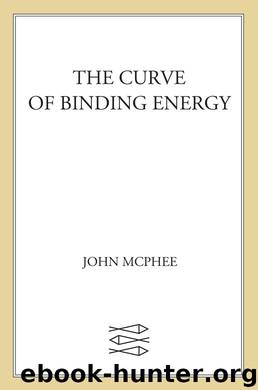The Curve of Binding Energy by John McPhee

Author:John McPhee
Language: eng
Format: epub
Publisher: Farrar, Straus and Giroux
Published: 2011-06-22T04:00:00+00:00
To be immensely destructive, a nuclear bomb does not have to be Hamlet. It can be many times less efficient—as the Hiroshima bomb was. The making of a nuclear bomb does not require the skill and invention that went into Bee, Hornet, and Scorpion. A crude fabrication producing a small yield, or even a fizzle yield, could kill tens of thousands of people and bring tall buildings to the ground.
Ted Taylor left Los Alamos in 1956. He now lives in Maryland, in suburban Washington, not far from the Atomic Energy Commission, and in western New York, on ninety acres of forested land in the Allegheny Mountains. He is an independent technological researcher in a small company he founded, and he has supported his work and his family on grants from foundations and on contracts with agencies of the federal government, including the A.E.C. By the hundreds of thousands of words, he and his colleagues produce computer-assisted studies dealing with matters as diverse as greenhouse agriculture, pollution-control economics, and the efficiency of the United States Postal Service. As he approaches the age of fifty, he would like to forget forever the craft of nuclear weaponry, but events make that impossible for him. With the ongoing rise of civilian nuclear power comes plutonium recycle, the fast breeder reactor, a world flow of weapons-grade material in the millions of kilograms. Over his shoulder, the horizon is stuffed with thunderheads. He, of all people, knows what might be done, and how easily, with stolen uranium-235 or plutonium-239. What worries him most is that “national full-scale violence may not apply as an inhibitory force,” for the so-called posture of deterrence, nation versus nation, would have no influence at all on a small group or an individual fabricating in secret a nuclear bomb. For a decade or so, he has attempted in any way he could to express his worry, in the light of his special knowledge, to the United States Congress, the Atomic Energy Commission, and the International Atomic Energy Agency, among others. He is only one of many who are equally worried, and he does not fail completely to get sympathetic attention. On the whole, though, he has been turned politely away. It is said of him that he makes the mistake of supposing that other people are as talented as he is. (“He seems to think that anybody could do it, but that is not so. If you wanted to make a bomb, you would need a Ted Taylor.”) Moreover, his cautions can be an irritant to people who see themselves as the Horatiuses of the energy crisis—to an Atomic Energy Commission that, on the whole, regards itself as part of “the nuclear business,” to a Consolidated Edison busy making “Clean Energy” for a cleaner environment. From some quarters, a chorus of disavowal places nuclear-materials safeguards below the threshold of reasonable worry.
“No one could just steal material and make a nuclear bomb.”
“It is not possible.”
“You would need your own Manhattan Project.”
Ted Taylor would
Download
This site does not store any files on its server. We only index and link to content provided by other sites. Please contact the content providers to delete copyright contents if any and email us, we'll remove relevant links or contents immediately.
| Automotive | Engineering |
| Transportation |
Whiskies Galore by Ian Buxton(42000)
Introduction to Aircraft Design (Cambridge Aerospace Series) by John P. Fielding(33122)
Small Unmanned Fixed-wing Aircraft Design by Andrew J. Keane Andras Sobester James P. Scanlan & András Sóbester & James P. Scanlan(32797)
Craft Beer for the Homebrewer by Michael Agnew(18238)
Turbulence by E. J. Noyes(8041)
The Complete Stick Figure Physics Tutorials by Allen Sarah(7366)
The Thirst by Nesbo Jo(6936)
Kaplan MCAT General Chemistry Review by Kaplan(6930)
Bad Blood by John Carreyrou(6617)
Modelling of Convective Heat and Mass Transfer in Rotating Flows by Igor V. Shevchuk(6434)
Learning SQL by Alan Beaulieu(6282)
Weapons of Math Destruction by Cathy O'Neil(6269)
Man-made Catastrophes and Risk Information Concealment by Dmitry Chernov & Didier Sornette(6013)
Digital Minimalism by Cal Newport;(5751)
Life 3.0: Being Human in the Age of Artificial Intelligence by Tegmark Max(5551)
iGen by Jean M. Twenge(5409)
Secrets of Antigravity Propulsion: Tesla, UFOs, and Classified Aerospace Technology by Ph.D. Paul A. Laviolette(5370)
Design of Trajectory Optimization Approach for Space Maneuver Vehicle Skip Entry Problems by Runqi Chai & Al Savvaris & Antonios Tsourdos & Senchun Chai(5066)
Pale Blue Dot by Carl Sagan(5002)
